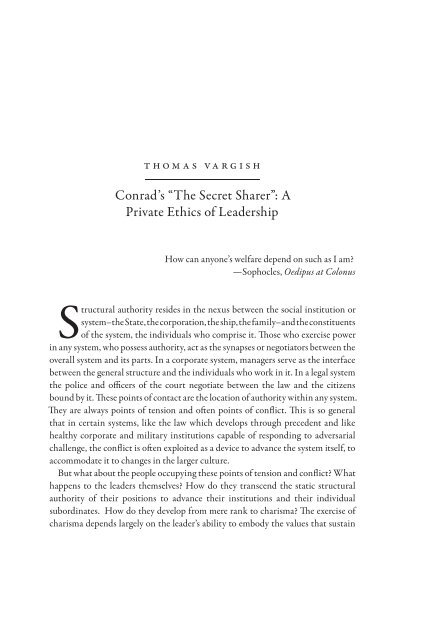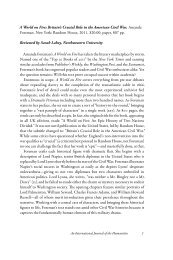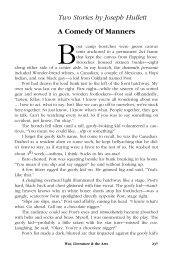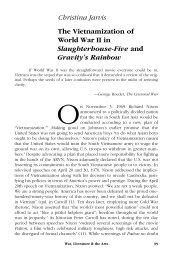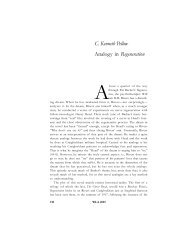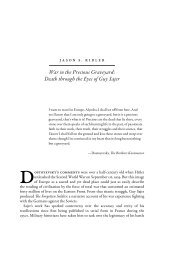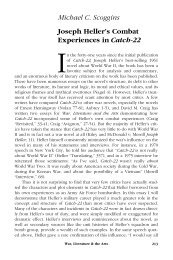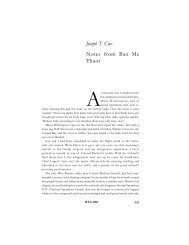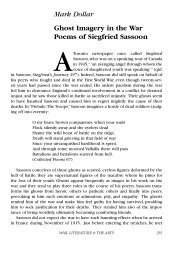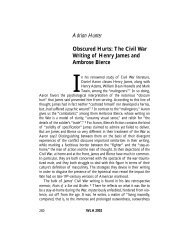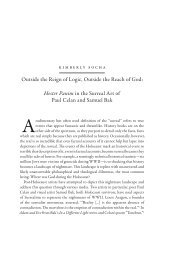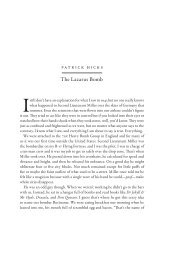Conrad's “The Secret Sharer”: A Private Ethics of Leadership
Conrad's “The Secret Sharer”: A Private Ethics of Leadership
Conrad's “The Secret Sharer”: A Private Ethics of Leadership
You also want an ePaper? Increase the reach of your titles
YUMPU automatically turns print PDFs into web optimized ePapers that Google loves.
T H O M A S V A R G I S H<br />
Conrad’s <strong>“The</strong> <strong>Secret</strong> <strong>Sharer”</strong>: A<br />
<strong>Private</strong> <strong>Ethics</strong> <strong>of</strong> <strong>Leadership</strong><br />
How can anyone’s welfare depend on such as I am?<br />
—Sophocles, Oedipus at Colonus<br />
Structural authority resides in the nexus between the social institution or<br />
system–the State, the corporation, the ship, the family–and the constituents<br />
<strong>of</strong> the system, the individuals who comprise it. Those who exercise power<br />
in any system, who possess authority, act as the synapses or negotiators between the<br />
overall system and its parts. In a corporate system, managers serve as the interface<br />
between the general structure and the individuals who work in it. In a legal system<br />
the police and <strong>of</strong>ficers <strong>of</strong> the court negotiate between the law and the citizens<br />
bound by it. These points <strong>of</strong> contact are the location <strong>of</strong> authority within any system.<br />
They are always points <strong>of</strong> tension and <strong>of</strong>ten points <strong>of</strong> conflict. This is so general<br />
that in certain systems, like the law which develops through precedent and like<br />
healthy corporate and military institutions capable <strong>of</strong> responding to adversarial<br />
challenge, the conflict is <strong>of</strong>ten exploited as a device to advance the system itself, to<br />
accommodate it to changes in the larger culture.<br />
But what about the people occupying these points <strong>of</strong> tension and conflict? What<br />
happens to the leaders themselves? How do they transcend the static structural<br />
authority <strong>of</strong> their positions to advance their institutions and their individual<br />
subordinates. How do they develop from mere rank to charisma? The exercise <strong>of</strong><br />
charisma depends largely on the leader’s ability to embody the values that sustain
authority in the cultural context where it is exercised. These embodiments are<br />
<strong>of</strong>ten, perhaps always, expressed as personal characteristics. To put it differently,<br />
a leader’s ability to recognize the authoritative characteristics in his or her own<br />
makeup and to translate these into a public identity permits the values to become<br />
shared–so that the experience <strong>of</strong> charisma for both leaders and followers is one <strong>of</strong><br />
sharing. 1 This is the most important social function <strong>of</strong> leadership and it can be used<br />
primarily for purposes <strong>of</strong> charity and social justice or for purposes <strong>of</strong> national and<br />
personal aggrandizement. For better or worse, charisma is a social phenomenon, an<br />
experience <strong>of</strong> sharing. Having acknowledged this broad function <strong>of</strong> leadership, I<br />
now want to leave the larger social sphere and move inward, into the inner dynamic<br />
<strong>of</strong> those who exercise practical authority.<br />
Everyone in a position <strong>of</strong> responsibility knows from experience that the exercise<br />
<strong>of</strong> practical authority involves trade<strong>of</strong>fs and conflicts between the pr<strong>of</strong>essional<br />
(public) and the personal (private) life. From a psychological standpoint the<br />
question quickly resolves itself into one <strong>of</strong> inner conflict, the tension or stress caused<br />
by the starvation <strong>of</strong> the personal self in the interest <strong>of</strong> social responsibility, whether<br />
that responsibility is characterized as religious, or social, or political, or military,<br />
or commercial, or corporate, or even familial. The representation <strong>of</strong> this conflict<br />
is a central concern <strong>of</strong> our greatest literature. Antigone in her long final speech<br />
recalls her thwarted desire to become a wife and mother; Brutus acknowledges his<br />
inner war between “genius” and “mortal instrument”; Milton’s Adam learns what<br />
it means to fail to govern where one adores; Dr. Frankenstein withdraws in the face<br />
<strong>of</strong> pr<strong>of</strong>essional disillusionment; Captain Vere feels paternal love for the person his<br />
conception <strong>of</strong> duty requires him to kill. And in the end these characters do not do<br />
well as leaders precisely because they have not resolved the conflict between their<br />
public and private identities, their pr<strong>of</strong>essional functions and their personal needs.<br />
We might admire them (Antigone); we might pity them (Vere); we might identify<br />
with them (Adam)–but they do not serve us as models <strong>of</strong> sustainable leadership.<br />
For that we need to go to those who, however ethically imperfect, have achieved<br />
this inner resolution, like Shakespeare’s Henry V, like Stendhal’s Napoleon, like<br />
Winston Churchill, like Martin Luther King. And more important than a list <strong>of</strong><br />
successful leaders (over which we might well disagree) will be an understanding <strong>of</strong><br />
the process <strong>of</strong> resolution itself, its costs and its returns.<br />
Achieving the Resolution: <strong>“The</strong> <strong>Secret</strong> <strong>Sharer”</strong><br />
In order to discuss this complex matter clearly and efficiently we need a narrative<br />
that deals with the internal conflict between personal and pr<strong>of</strong>essional authority<br />
x War, Literature & the Arts
and that gives an account <strong>of</strong> its successful resolution as the key to creative leadership.<br />
Joseph Conrad’s astonishing parable <strong>of</strong> command and its requirements in <strong>“The</strong><br />
<strong>Secret</strong> <strong>Sharer”</strong> (1910) places the process <strong>of</strong> inner resolution before us with an<br />
immediacy and power unequaled elsewhere in our literature.<br />
By the time he published this story, Conrad had extensive experience <strong>of</strong> the<br />
world <strong>of</strong> affairs, especially the world <strong>of</strong> the sea, culminating in a captaincy in the<br />
British merchant marine at the age <strong>of</strong> thirty. Two years later, in 1889, he turned to<br />
fiction and in 1994 his career as a seaman ended as the result <strong>of</strong> a tropical illness<br />
suffered in the Belgian Congo. During the sixteen years before <strong>“The</strong> <strong>Secret</strong> <strong>Sharer”</strong><br />
appeared he wrote a number <strong>of</strong> complex and influential narratives dealing with<br />
the ethical and psychological problems <strong>of</strong> authority and with failures <strong>of</strong> leadership.<br />
Most famous <strong>of</strong> these include Heart <strong>of</strong> Darkness (1898), Lord Jim (1900), and<br />
Nostromo (1904). In much <strong>of</strong> this work his attention centers on the mind <strong>of</strong> the<br />
person who appears to be the leader, who wants to think <strong>of</strong> himself as leader, who<br />
sees himself as a failed leader, who has been tested and who has failed due to some<br />
dark inner weakness in himself and who dies or who wanders seeking redemption.<br />
<strong>“The</strong> <strong>Secret</strong> Sharer,” however, tells <strong>of</strong> the successful integration <strong>of</strong> personal and<br />
pr<strong>of</strong>essional authority, the creative synergy <strong>of</strong> private and pr<strong>of</strong>essional aspiration,<br />
and this makes it very rare among serious, complex studies <strong>of</strong> leadership.<br />
The narrator is a young <strong>of</strong>ficer who has just been given his first command, to<br />
captain a merchant sailing ship back to Britain from the Gulf <strong>of</strong> Siam. He does<br />
not tell us exactly how he received the appointment but the implication is that he<br />
possesses connections and a background that would favor him and that place him<br />
at a social distance above his <strong>of</strong>ficers and the ordinary seamen. Suddenly he finds<br />
himself master <strong>of</strong> an unfamiliar ship in command <strong>of</strong> <strong>of</strong>ficers and a crew who are<br />
strange to him. He is absolutely responsible and absolutely isolated, conditions<br />
which he feels acutely. As he wanders the ship alone at night, having taken the<br />
watch himself–an extraordinary step which he immediately sees as reflecting<br />
badly on his leadership–he discovers a naked man clinging to a rope side ladder.<br />
He permits the man to climb aboard and listens to his story. The stranger, named<br />
Leggatt, becomes the “secret sharer” <strong>of</strong> the tale. He has a background that brings<br />
him into social and psychological alignment with the narrator: his father is a parson<br />
in Norfolk and therefore a gentleman; he enjoyed the same prestigeous merchant<br />
marine schooling as the narrator; and he has served as a ship’s <strong>of</strong>ficer. The narratorcaptain<br />
immediately associates Leggatt with himself. But Leggatt is an outlaw,<br />
having killed an insubordinate seaman for refusing a crucial order when a storm<br />
threatened their ship. The narrator, without making a conscious decision, hides,<br />
An International Journal <strong>of</strong> the Humanities x
feeds, and protects the secret sharer in his cabin until–amid a splendid virtuoso<br />
display <strong>of</strong> high-risk seamanship–he secures his escape.<br />
Conrad’s story is exciting as a tale <strong>of</strong> the sea and pr<strong>of</strong>ound in its exploration <strong>of</strong> the<br />
psychology <strong>of</strong> leadership. The narration never explicitly explains this psychology,<br />
though the narrator gives pointers in the form <strong>of</strong> hints couched in abbreviated,<br />
oblique “masculine” formulations. But as readers we have constantly before us an<br />
intriguing psychological opacity as we try to understand not the sharer (who is<br />
plain enough) but the narrator himself. Conrad forces the reader to come to terms<br />
with the inner drama by means <strong>of</strong> this opacity, as if the parable must be understood<br />
only by the happy few who have the eyes and ears for it. The technique <strong>of</strong> veiled<br />
meaning forces us to make a positive effort to identify the values <strong>of</strong> the narrator.<br />
Why does he harbor Leggatt? Why does he risk his entire career, his whole future<br />
life, to protect someone for whom he has no formal responsibility? Why does he<br />
jeopardize his first command? His crew? His ship? To find the answers to these<br />
questions as they become more and more pressing the reader must attend urgently<br />
to the narrative, must become a kind <strong>of</strong> co-conspirator, must discover in the<br />
process both the pressures and the terrors <strong>of</strong> leadership. Only in this way will the<br />
reader comprehend their ultimate resolution in a triumphant creative performance<br />
that guarantees pr<strong>of</strong>essional because it secures personal success. <strong>“The</strong> <strong>Secret</strong> <strong>Sharer”</strong><br />
enables us to move to the heart <strong>of</strong> the conflict <strong>of</strong> public and private demands with<br />
a speed and precision unmatched in more abstract (objective, historical, scientific)<br />
presentations. Here again literature can show us the actual life which gives birth to<br />
whatever authentic authority we will ever know.<br />
The narrator-captain is never named. Nor is his ship. The obvious putative reason<br />
for this is <strong>of</strong> course the security <strong>of</strong> his reputation, even though he tells the story<br />
from a distance <strong>of</strong> years. The effect <strong>of</strong> the namelessness, however, is to enlarge the<br />
specific history into a kind <strong>of</strong> parable, a parable <strong>of</strong> youth and <strong>of</strong> the acquisition<br />
<strong>of</strong> authority, which the narrator possesses in its preliminary manifestations as the<br />
story opens. He has power: he is captain. And he has knowledge: he understands<br />
completely the passage from the Gulf <strong>of</strong> Siam to Britain. He pictures to himself<br />
“the coming passage through the Malay Archipelago, down the Indian Ocean, and<br />
up the Atlantic. All its phases were familiar enough to me, every characteristic,<br />
all the alternatives which were likely to face me on the high seas–everything! . . .<br />
except the novel responsibility <strong>of</strong> command.” He has everything, that is, except the<br />
ultimate requirements <strong>of</strong> his authority:<br />
x War, Literature & the Arts
It must be said, too, that I knew very little <strong>of</strong> my <strong>of</strong>ficers. . . . Neither did I<br />
know much <strong>of</strong> the hands forward. All these people had been together for<br />
eighteen months or so, and my position was that <strong>of</strong> the only stranger on<br />
board. . . . But what I felt most was my being a stranger to the ship; and if<br />
all the truth must be told, I was somewhat <strong>of</strong> a stranger to myself. 2<br />
We could say that he has technical knowledge, but not that knowledge <strong>of</strong> others or<br />
<strong>of</strong> himself that will enable him to achieve a creative authority, one that can reach<br />
beyond the regulations, one containing the ability to resolve the public with the<br />
private life.<br />
From the opening <strong>of</strong> the story Conrad has directed our attention to what the<br />
narrator knows and what he does not know. The first sentence gives us a hint <strong>of</strong><br />
what we are in for: “On my right hand there were lines <strong>of</strong> fishing stakes resembling<br />
a mysterious system <strong>of</strong> half-submerged bamboo fences, incomprehensible in its<br />
division <strong>of</strong> the domain <strong>of</strong> tropical fishes, and crazy <strong>of</strong> aspect as if abandoned for<br />
ever by some nomad tribe <strong>of</strong> fishermen now gone to the other end <strong>of</strong> the ocean;<br />
for there was no sign <strong>of</strong> human habitation as far as the eye could reach” (7). The<br />
paragraph goes on to give reinforcing images <strong>of</strong> the isolation and above all <strong>of</strong> the<br />
opacity hinted at in the introductory sentence. The order <strong>of</strong> the fishing stakes is<br />
“mysterious” and “incomprehensible,” “crazy <strong>of</strong> aspect”—unless one understands<br />
the movement <strong>of</strong> the fish beneath the surface. But those who do understand that<br />
movement are not present to explain it so that if we did wish to understand the<br />
surface pattern, its origin and its order, we would have to go beneath the surface<br />
and observe a world that contains different values and different forces from those<br />
above the water line. This <strong>of</strong> course is the reader’s assignment, to go beneath the<br />
surface <strong>of</strong> the explicit events to their springs and sources in the narrator’s mind.<br />
We have seen that at the beginning <strong>of</strong> his journey the narrator feels a stranger<br />
on board the ship–a stranger to his crew, to the ship, to himself. He feels acutely<br />
the isolation <strong>of</strong> his situation and asks himself if he will prove worthy <strong>of</strong> his first<br />
command. He anxiously imagines the sea and sky as “spectators” and “judges”; he<br />
senses uncomfortably that the stars are a “multitude <strong>of</strong> celestial bodies staring down<br />
at one”; he wonders “how far I should turn out faithful to that ideal conception <strong>of</strong><br />
one’s own personality every man sets up for himself secretly” (8, 9). As he paces the<br />
deck alone in the dark he quiets these anxieties by concocting a comforting story <strong>of</strong><br />
the way things are, a soothing script for his world:<br />
An International Journal <strong>of</strong> the Humanities x
I took heart from the reasonable thought that the ship was like<br />
other ships, the men like other men, and that the sea was not<br />
likely to keep any special surprises expressly for my discomfiture.<br />
Arrived at that comforting conclusion, I bethought myself <strong>of</strong> a cigar<br />
and went below to get it. . . . And suddenly I rejoiced in the great security<br />
<strong>of</strong> the sea as compared with the unrest <strong>of</strong> the land, in my choice <strong>of</strong> that<br />
untempted life presenting no disquieting problems, invested with an<br />
elementary moral beauty by the absolute straightforwardness <strong>of</strong> its appeal<br />
and by the singleness <strong>of</strong> its purpose. (11)<br />
Every assumption in this little fantasy falls before the events that follow: the<br />
particular character <strong>of</strong> the ship becomes crucial to her management; the individual<br />
characters <strong>of</strong> his subordinates must be taken into account; the sea has in store a<br />
very special surprise for him. Into this false complacency Leggatt intrudes, and his<br />
arrival contradicts everything the narrator has been thinking. Suddenly the life <strong>of</strong><br />
the sea proves to be one <strong>of</strong> continual unrest, temptation, disquiet–and above all<br />
multiple in its nature, devious in its appeal, duplicitous in its purpose.<br />
When Leggatt, as the sea’s special surprise for the narrator, climbs on board the<br />
parable goes into overdrive. His name suggests an envoy or ambassador, as in a<br />
legation. He comes from the Sephora, “self-bearer” or that which gives birth to the<br />
self. Images <strong>of</strong> doubleness begin to proliferate: the “sleeping suit” that the narrator<br />
lends Leggatt fits perfectly; the narrator calls him “my double” and his own “gray<br />
ghost”; their physical similarities are pointed to: “It was, in the night, as though<br />
I had been faced by my own reflection in the depths <strong>of</strong> a somber and immense<br />
mirror,” that as they spoke they would have treated an intruder to “the uncanny<br />
sight <strong>of</strong> a double captain busy talking in whispers with his other self ” (14-18). But<br />
in what sense is Leggatt a messenger who will aid in the birth <strong>of</strong> the narrator’s<br />
selfhood? And to what degree and in what way is he his “double?”<br />
Having stressed the doubleness <strong>of</strong> the encounter and thus for the attentive reader<br />
the potential depth <strong>of</strong> the association, the narrator admits that in actual personal<br />
appearance “He was not a bit like me, really” (17). But it is not the function <strong>of</strong><br />
a double to provide a simple mirror image <strong>of</strong> the protagonist, either physically<br />
or psychologically. Doubles abound in modernist literature from Dostoevsky<br />
through Faulkner and they function chiefly to stress certain propensities <strong>of</strong> the<br />
protagonist, where he might be weak or in what moral or mental direction he<br />
might be pointed. In Crime and Punishment, which also deals with transgression<br />
and its spiritual consequences, Dostoevsky makes brilliant use <strong>of</strong> his character<br />
x War, Literature & the Arts
Svidrigaylov whose spiritual damnation appears as a vivid warning for the<br />
protagonist Raskolnikov, even though the two characters are widely separated in<br />
appearance and circumstances. Raskolnikov sees the warning in his double and<br />
turns in revulsion from such a future. But what does Leggatt teach the narrator <strong>of</strong><br />
<strong>“The</strong> <strong>Secret</strong> <strong>Sharer”</strong>? How will he help him find himself?<br />
Leggatt is a failed leader. He has been arrested by his own captain for killing the<br />
insubordinate seaman. It may be that few <strong>of</strong>ficers would behave as courageously in<br />
a crisis (his initiative in setting a reefed foresail saved the Sephora from the storm);<br />
it may be that knocking down the insubordinate seaman was a necessary step; it<br />
may be that Leggatt strangled him in a state <strong>of</strong> unconsciousness when a huge wave<br />
washed over the ship. None <strong>of</strong> these extenuations changes the fact that he has killed<br />
a subordinate and that with the decision <strong>of</strong> his captain to hold him responsible his<br />
career as an <strong>of</strong>ficer is over. But, remarkably, Leggatt does not collapse in the face <strong>of</strong><br />
this adversity. He does not see himself as guilty. Above all he does not hold himself<br />
answerable to the law for his action: “‘My father’s a parson in Norfolk. Do you see<br />
me before a judge and jury on that charge? For myself I can’t see the necessity’” (14).<br />
He sees his act in its circumstances as beyond the understanding <strong>of</strong> his legal peers<br />
and thus as beyond their reach:<br />
“You don’t suppose I am afraid <strong>of</strong> what can be done to me? Prison or<br />
gallows or whatever they may please. But you don’t see me coming back<br />
to explain such things to an old fellow in a wig and twelve respectable<br />
tradesmen, do you? What can they know whether I am guilty or not–or<br />
<strong>of</strong> what I am guilty, either? That’s my affair. What does the Bible say?<br />
‘Driven <strong>of</strong>f the face <strong>of</strong> the earth.’ Very well. I am <strong>of</strong>f the face <strong>of</strong> the earth<br />
now. As I came at night so I shall go.” (37)<br />
Leggatt by an act <strong>of</strong> will exempts himself from the judgment <strong>of</strong> his society. When<br />
he leaves the narrator’s ship he becomes radically isolated, like Cain, wandering on<br />
the face <strong>of</strong> the earth, exiled but in possession <strong>of</strong> himself. The narrator watches and<br />
learns.<br />
What strikes the narrator as most remarkable is Leggatt’s firmness. He admires<br />
his calm, his self-possession, “that something unyielding in his character which was<br />
carrying him through so finely,” “the unalterable purpose <strong>of</strong> his action” (37). This<br />
quality may be natural to Leggatt but it was developed during his imprisonment<br />
on the Sephora after its captain relieved him <strong>of</strong> his command. He had time then to<br />
think through the nature <strong>of</strong> his action and his degree <strong>of</strong> responsibility. He came to<br />
An International Journal <strong>of</strong> the Humanities x
the conclusion that he cannot be judged by the “twelve respectable tradesmen” who<br />
as an English jury represent the law and the interests <strong>of</strong> society. Leggatt actually<br />
denies that the system can judge him, and this impresses the narrator who had<br />
judgment by others so much on his mind before the secret sharer came aboard. And<br />
Leggatt’s chosen alienation is a remarkable, modernist, extreme existential gesture:<br />
to declare oneself free <strong>of</strong> social context. Billy Budd couldn’t do it and Captain<br />
Vere did not help him. Unlike Billy, Leggatt does not bless his captain. In effect he<br />
becomes a unique system unto himself, wandering the face <strong>of</strong> the earth, and in the<br />
process he embodies a critique <strong>of</strong> the home system, the traditional system <strong>of</strong> legal<br />
precedent and <strong>of</strong> hierarchical command.<br />
The home system is represented in its blind inertia by Captain Archbold<br />
<strong>of</strong> the Sephora. He comes on board the narrator’s vessel seeking the escaped Leggatt.<br />
He serves as the representative <strong>of</strong> established law and order, the conventional<br />
system <strong>of</strong> justice that Leggatt has rejected. Captain Archbold’s chief characteristic<br />
is a “spiritless tenacity,” suitable for the embodiment <strong>of</strong> unimaginative process and<br />
procedure, <strong>of</strong> the single point <strong>of</strong> view. The narrator determines that Archbold has<br />
made up his mind not to credit Leggatt for setting the reefed foresail. He claims to<br />
have given the order himself and then dutifully passes the credit on to Providence.<br />
“God’s own hand in it,” he asserts. The narrator asks:<br />
“You were very anxious to give up your mate to the shore people, I believe?”<br />
He was. To the law. His obscure tenacity on that point had in it<br />
something incomprehensible and a little awful: something, as it were,<br />
mystical, quite apart from his anxiety that he should not be suspected <strong>of</strong><br />
“countenancing any doings <strong>of</strong> that sort.” Seven-and-thirty virtuous years at<br />
sea, <strong>of</strong> which over twenty <strong>of</strong> immaculate command, and the last fifteen in<br />
the Sephora, seemed to have laid him under some pitiless obligation. (27)<br />
In his absolute devotion to the prescribed law and in his inability to perceive ethical<br />
alternatives, his lack <strong>of</strong> a metasystem, Archbold represents a kind <strong>of</strong> degenerate<br />
Captain Vere, stripped <strong>of</strong> the intelligence, passion, and elegance <strong>of</strong> Melville’s leader.<br />
But Leggatt, as we have seen, is no Billy Budd.<br />
It is this Archbold version <strong>of</strong> justice, mechanical and spiritless, that Leggatt<br />
rejects and that he leads the narrator to circumvent. This is no easy matter, involving<br />
as it does a kind <strong>of</strong> existential departure–a departure not just from conventional<br />
legal structure but from the cosmic or religious validation that backs it:<br />
x War, Literature & the Arts
Later in the afternoon we had a cautious try at whispering. The Sunday<br />
quietness <strong>of</strong> the ship was against us; the stillness <strong>of</strong> air and water around<br />
her was against us; the elements, the men were against us–everything was<br />
against us in our secret partnership; time itself–for this could not go on<br />
forever. The very trust in Providence was, I suppose, denied to his guilt.<br />
Shall I confess that this thought cast me down very much? And as to the<br />
chapter <strong>of</strong> accidents which counts for so much in the book <strong>of</strong> success, I<br />
could only hope that it was closed. For what favorable accident could be<br />
expected? (31)<br />
With the loss <strong>of</strong> Providence as guide and ally no fortunate accidents can be<br />
expected. For Leggatt (a parson’s son) and for the narrator and for most sailors<br />
in the nineteenth century when the story is set, favorable accidents indicate the<br />
care <strong>of</strong> Providence. Archbold attributes to Providence the successful setting <strong>of</strong> the<br />
reefed foresail by which Leggatt saved his ship. To abandon trust in Providence<br />
is to cut oneself loose from a structure <strong>of</strong> hope and consolation, to feel a cosmic<br />
bereavement that can be imagined only distantly by most <strong>of</strong> us now. In such an<br />
isolation, what remains to guide us? What is left? And Leggatt’s answer, the answer<br />
from the ship Sephora, is the inner leadership <strong>of</strong> the self.<br />
This process <strong>of</strong> self-creation lies at the heart <strong>of</strong> the story, and Conrad presents it<br />
as an experience <strong>of</strong> doubling, <strong>of</strong> finding an alternative nature, <strong>of</strong> achieving an inner<br />
metasystem, an ethic <strong>of</strong> independence from the conventional socially acknowledged<br />
ethos. It isn’t easy: “all the time the dual working <strong>of</strong> my mind distracted me<br />
almost to the point <strong>of</strong> insanity. I was constantly watching myself, my secret self, as<br />
dependent on my actions as my own personality, sleeping in that bed, behind that<br />
door which faced me as I sat at the head <strong>of</strong> the table. It was very much like being<br />
mad, only it was worse because one was aware <strong>of</strong> it” (24). But through this duplicity<br />
(doubleness) the narrator-captain learns to be firm in his relation with his men. His<br />
need to protect Leggatt, the other self that is becoming his metasystem, forces him<br />
to show no weakness, no quarter, to his subordinates. He acquires the firmness,<br />
the self-possession he so much admired in the other. His unremitting preservation<br />
<strong>of</strong> this other self is, to use Leggatt’s phrase, his own affair. It teaches him to lead<br />
without faltering because faltering would be fatal for his secret sharer.<br />
Learning this lesson interferes with the pleasure <strong>of</strong> being in command <strong>of</strong> his<br />
ship: “I was not wholly alone with my command; for there was that stranger in my<br />
cabin. Or rather, I was not completely and wholly with her. Part <strong>of</strong> me was absent.<br />
That mental feeling <strong>of</strong> being in two places at once affected me physically as if the<br />
An International Journal <strong>of</strong> the Humanities x
mood <strong>of</strong> secrecy had penetrated my very soul” (32-33). The comforting script with<br />
which he started his narrative is gone, and with it the weaknesses <strong>of</strong> self-doubt. The<br />
narrator is creating a metasystem, represented for a time by Leggatt–his firmness,<br />
resolution, and self-trust–but ultimately to be converted by the narrator’s own<br />
courage into a tested foundation <strong>of</strong> leadership.<br />
This resolution is fixed by the narrator’s desire to see his secret sharer safely <strong>of</strong>f<br />
the ship. In order to let Leggatt swim to shore he approaches an island called Kohring<br />
and sails under the face <strong>of</strong> its massive cliff. “It was now a matter <strong>of</strong> conscience<br />
to shave the land as close as possible–for now he must go overboard whenever the<br />
ship was put in stays.” But the narrator-captain takes his ship in much closer than<br />
is necessary, especially given Leggatt’s prize-winning swimming power <strong>of</strong> which<br />
much is made when he first comes on board. The closeness to the land is a gift that<br />
Leggatt does not need. The narrator also presses on his double some money and a<br />
floppy white hat to protect his head from the tropical sun. The reader knows that<br />
these gifts are not so much to Leggatt the exile as they are necessary to the narrator<br />
as he parts with his double, a kind <strong>of</strong> acknowledgment <strong>of</strong> the legacy <strong>of</strong> leadership<br />
that Leggatt will leave behind. In sailing in so close, putatively looking for a land<br />
wind, the narrator captain risks his own life, the lives <strong>of</strong> his men, above all the ship<br />
itself. He risks them all for no practical purpose, for no publicly defensible reason.<br />
No jury would acquit him <strong>of</strong> his rashness. As the ship moves in close the chief<br />
mate cracks under the strain and the narrator subdues him, subdues him without<br />
harming him. He thinks <strong>of</strong> Leggatt, “perhaps he was able to understand why, on<br />
my conscience, it had to be thus close–no less” (42,44). What does he mean, “on my<br />
conscience?” To whom does he owe the indefensible risk he chooses to take? The<br />
reader must provide an answer to this question and the only answer that remains is<br />
that he owes the gesture to himself.<br />
What is strangest in all this may not be the narrator’s self-referential choice, but<br />
the fact that readers rejoice in it. We rejoice in the thrilling gesture at the end.<br />
Why? Because we intuit that something more important than responsible, efficient<br />
management is going on. And something more important even than British justice,<br />
than trial by jury. We the readers are the privileged “witnesses” and “judges” who<br />
haunted the narrator at the beginning <strong>of</strong> his command. We see in the impractical<br />
and dangerous virtuosity something even more important than the safety <strong>of</strong> the<br />
ship: the achievement <strong>of</strong> a truly creative authority.<br />
At the crucial last moment the narrator tries to determine the direction <strong>of</strong> the<br />
unfamiliar ship in the calm sea. He looks desperately for a sign, for a marker that<br />
will give him the knowledge that will save them all. Suddenly he spots his own white<br />
x War, Literature & the Arts
floppy hat on the black water, the hat that had washed <strong>of</strong>f Leggatt’s head as he swam<br />
away. He sees it drifting forward and knows that the ship has begun to gather stern<br />
way. Just in time he gives the order to shift the helm and the ship comes round. The<br />
image <strong>of</strong> system and metasystem could not be more vivid. In order to determine the<br />
direction <strong>of</strong> the home system, the ship, the leader requires reference to a metasystem,<br />
the sea as marked by the white hat. And the fact that the hat has been left behind<br />
by Leggatt, who has unknowingly served as the narrator’s psychological and<br />
ethical guide, enables the narrator to succeed as a leader, to incorporate Leggatt’s<br />
independence and firmness into his single public identity as captain. Having<br />
achieved this integration he can say goodbye to his external second self:<br />
Walking to the taffrail . . . I was in time to catch an evanescent glimpse <strong>of</strong><br />
my white hat left behind to mark the spot where the secret sharer <strong>of</strong> my<br />
cabin and <strong>of</strong> my thoughts, as though he were my second self, had lowered<br />
himself into the water to take his punishment; a free man, a proud<br />
swimmer striking out for a new destiny. (45-46)<br />
And we know as we read this that the narrator himself, having overcome his doubts<br />
and fears, will also strike out, will succeed as a leader because he has become whole<br />
as a person, as the kind <strong>of</strong> person who can command. He has incorporated Leggatt’s<br />
powers with his own in the kind <strong>of</strong> authoritative integrity that only those who can<br />
summon up a private and alternative ethics ever achieve.<br />
A <strong>Private</strong> <strong>Ethics</strong> <strong>of</strong> <strong>Leadership</strong>?<br />
We grant the narrator-captain our applause because he has earned it, and because<br />
we intuit or know from experience the immense discipline and the immense<br />
loneliness <strong>of</strong> leadership. For this reason we more than tolerate the risk he takes<br />
with the ship and the crew. But the story does leave behind certain unresolved and<br />
perhaps unresolvable ethical questions. Does the narrator have the right to risk all<br />
for the sake <strong>of</strong> his commitment to Leggatt and what Leggatt stands for? Would we<br />
applaud his action if we were on board? Does a prospective leader have the right–<br />
with all the lifetime <strong>of</strong> good service before him that might justify, might pay for the<br />
risk–to endanger without consultation human lives perhaps as worthy as his own?<br />
The story leaves these questions behind without addressing them directly, but the<br />
implied answer is affirmative. <strong>“The</strong> <strong>Secret</strong> <strong>Sharer”</strong> suggests that there are certain<br />
moments in our lives when extravagant, irresponsible gestures become necessary<br />
if we are to continue to grow. And beyond this it suggests that true leaders are<br />
An International Journal <strong>of</strong> the Humanities x
expensive in just this way: that they risk the rest <strong>of</strong> us. Their development<br />
necessitates departures from the established ethos, the ethos <strong>of</strong> Captain Archbold<br />
and the conventional ethical coordinates that map out prescribed actions.<br />
The message is elitist and may be dangerously so: that leaders, even prospective<br />
leaders, must take for themselves a margin <strong>of</strong> independence that the rest <strong>of</strong> us cannot<br />
share. This is Raskolnikov’s theory at the beginning <strong>of</strong> Crime and Punishment and<br />
Dostoevsky puts him through hell for acting on it. But Conrad takes a different<br />
view. He seems to be telling us that in the immense play <strong>of</strong> authority and in its<br />
immense ambiguities leaders will find the conventional ethos, the Archbold view<br />
<strong>of</strong> justice, inadequate. It will not be sufficiently flexible, precise, and extreme to<br />
cover the radical situations in which leaders function. Leaders must possess an<br />
alternative ethos, an ethical metasystem by which to measure the efficacy and<br />
perhaps even the justice <strong>of</strong> the law, <strong>of</strong> the established home system. There will be<br />
moments when the received definition <strong>of</strong> duty will prescribe the wrong action–<br />
Captain Archbold’s action, or Captain Vere’s–or when it will have nothing to say.<br />
But leaders cannot afford to have nothing to say, nowhere to turn. Leaders must<br />
act in a single lucid gesture and give an unequivocal command. Leaders can make<br />
this single gesture, utter this single command, only if a private self sustains them<br />
secretly from within, beyond the order <strong>of</strong> those conventional systems <strong>of</strong> prudence<br />
and duty that regulate most <strong>of</strong> our perceived choices.<br />
Notes<br />
1. For a related discussion <strong>of</strong> charisma see Raphael Falco, Charismatic Authority in Early Modern<br />
English Tragedy (Baltimore: The Johns Hopkins Up, 2000).<br />
2. Joseph Conrad, <strong>“The</strong> <strong>Secret</strong> Sharer,” The Portable Conrad, ed. Michael Gorra (New York:<br />
Penguin Classics, 2007), 10, 9.<br />
Thomas Vargish teaches literature and film at the United States Air Force Academy.<br />
He has published books and essays on nineteenth- and twentieth-century literature and<br />
cultural history. Pr<strong>of</strong>essor Vargish holds degrees from Columbia, Oxford, Princeton, and<br />
Lund universities and has been a Rhodes Scholar and Guggenheim Fellow.<br />
x War, Literature & the Arts


